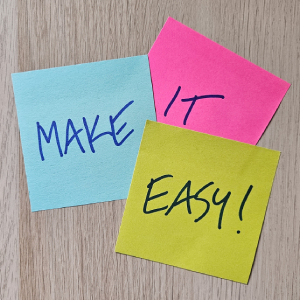Should you hire a group facilitator? They’re an investment and it takes time to bring them up to speed; and after all, you’ve been leading team meetings, board meetings, and stakeholder meetings forever. If that sounds like your internal dialogue, this article is for you – especially if you’ve ever had your schedule taken over by meeting planning or had your meeting stray off course with little to show for the effort.
Let’s keep you out of trouble! You can use a more discerning rationale when deciding whether or not a group facilitator will be a good investment for your next important meeting.
Here’s what to consider:
WHAT do facilitators do best? “Facilitate” means “to make easy.” Professional facilitators make it easy for leaders and teams to plan and deliver important meetings. The value of their work comes from three sources:
- Impartiality. Facilitators focus on the process of the meeting, with no stake in the topics being discussed. From this position, they can operate in ways that aren’t open to you or other attendees. For instance, they can conduct confidential interviews with your meeting participants, or they can enforce meeting agreements (ground rules) even if a senior executive violates them.
- Thought-partnership. As a third party who works with many clients, a facilitator offers perspectives outside your normal circle of colleagues. They can give you insights into the dynamics of your group as well as new ideas about how to run the meeting. With the options they offer, you’ll be able to address the unique challenges of your group or your meeting.
- Meeting expertise. Facilitators are trained in group dynamics and the methods for efficiently moving a group through an agenda. Their experience in agenda design and myriad facilitation methods will enliven your attendees, enrich the discussion, manage difficult situations, increase productive use of time, address conflict, and lead to meaningful results. In effect, their meeting toolkit is far bigger than yours and can really make your meeting stand out.
WHEN should you hire a facilitator? In any of the following scenarios, a facilitator will help you deliver a thoughtfully planned, productive, and enjoyable meeting:
- Senior Management is in Attendance. Your supervisor and other senior leaders will expect an efficient, focused meeting that makes appropriate use of their presence and doesn’t waste their valuable time. That puts you in the hot seat. A facilitator will help you design an efficient meeting agenda that makes the most of every person’s knowledge and perspectives while leading to concrete outcomes – such as agreements, decisions, strategies, and action plans. In partnership with you, your facilitator will also design appropriate ways to engage these important attendees in advance of the meeting.
- The Cost of the Meeting is High. For meetings involving many people or senior managers, the biggest meeting expense is often the labor cost associated with those attending. While it seems counter-intuitive to add the cost of a facilitator to such meetings, a good facilitator will give you these returns on investment: (1) a shorter, more efficient planning period, (2) a well-designed agenda and professional delivery, (3) active engagement of the participants, and (5) clear results in the form of agreements, decisions, plans, problem-solving, etc.
- Your Meeting Topic Is Urgent and/or Important. The stakes are higher in meetings that deal with urgent or critical situations or other important matters. High stakes are more likely to stir up high emotion or entrench people in positions, which can be difficult to manage for untrained meeting leaders. A facilitator’s training and experience will help your group to navigate such situations with greater ease, creativity, and probability of resolution.
- You Need Inspired Thinking to Solve a Problem. When your meeting calls for creative thinking, ingenious solutions, or inspired leaps of vision, a facilitator trained in innovation methods will give your group the stimulus it needs. With knowledge of specific methods such as design sprint, design thinking, and lotus blossom and other creativity techniques, they’ll help your group frame the situation, stimulate creative thinking beyond your group’s normal range, and arrive at robust solutions in surprisingly short periods of time.
- Your Meeting Conditions are Challenging. Challenging meeting conditions include groups larger than 20 people, hybrid meetings involving large groups, conflict among participants, making difficult decisions, and navigating complexity or uncertainty. A seasoned facilitator will have the training, experience, emotional intelligence, and expansive toolkit to handle such challenging conditions in a way that respects individuals and moves the group toward resolution of the issues.
- Your Group Has Poor Meeting Habits. If your group has a history of drifting off-topic, talking over each other, taking sides, waffling on decisions, ending meetings without achieving much, lacking follow-through, and exhibiting other poor meeting habits, consider engaging a facilitator over a period of time. With a facilitator’s example and reinforcement, your team will learn improved meeting habits and increase their productivity over the long run.
- You Want to Participate. If you’re the defacto leader or head of the meeting, you may not want to run the meeting, because you want to listen deeply or contribute subject matter expertise during discussions. A facilitator will free you up to participate while conducting the meeting according to your goals. In addition, they’ll work with you to plan the meeting and give guidance on your best avenues for participating, depending on group dynamics.
Are you facing any of these meeting conditions? If so, consider hiring a facilitator to create a meeting success that will fill you with pride.










